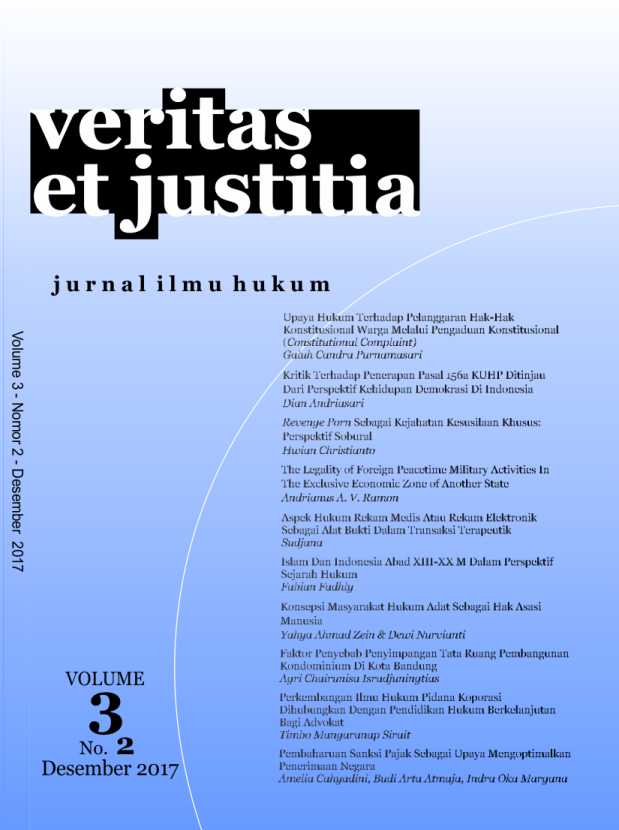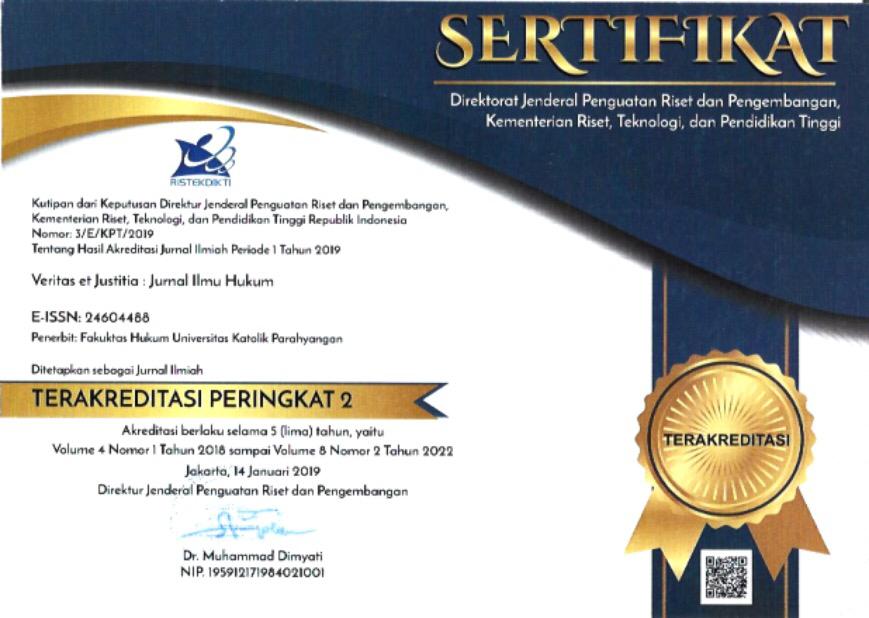KRITIK TERHADAP PENERAPAN PASAL 156a KUHP DITINJAU DARI PERSPEKTIF KEHIDUPAN DEMOKRASI DI INDONESIA
DOI:
https://doi.org/10.25123/vej.v3i2.2688Abstrak
Since long time every application of Article 156a of the Criminal Code has always caused social tension, social situation becomes very sensitive. These conditions lead to social conflicts. The issue of religion then became a commodity in the narrative of the mass media, into a debate. In the end in some cases, it always attributes the threat of democratic life. Conflict in the name of religion also surfaced, at least social tension raised after the Judge's decision by using the article. Religion is a problem that can not be separated from what should and what is real. These two things will continue to develop whereby dialectics may occur between them. If in the past religion was seen to be close to some elements of society, there was a growing tendency to recognize the differentiation between these elements and to legitimize the division of labor between the elements. But this differentiation is not accepted by all religious communities. The state's hegemony against religion is more often the legitimacy of violence and unilateral truth claims. Debate about it then led to a lot of interpretation, cross interpretation of the dispute then led to the court using the criminal justice system approach. Here is the Law as the result of social process, which should be studied as a social reality, indicating that there is a need to broaden the perspective, meaning not only to understand the rule of law from the point of logical consistency of the rules only, but also to be viewed from aspects of the process of human relations in society both individually and institutionally. Using the sociological juridical approach, the author tries to discuss how the effect of the application of article 156a of the Criminal Code in the life of democracy in Indonesia and how the prospect of future arrangement related to the formulation of religious offense in the perspective of ius constituendum.
Referensi
Daftar Pustaka
Barda Nawawi Arif, Delik Agama (revisi ke-5), Semarang, Badan Penerbitan Undip, 2008.
Barda Nawawi Arif, Bunga Rampai Kebijakan Hukum Pidana, Citra Aditya Bakti, Bandung, 2002
Bernard Arif Sidharta, Ilmu Hukum Indonesia, Jakarta, Genta Publishing, 2015.
David Betham, Democracy and Human Rights (Cambridge and Malden: Polity Press), 2000.
Deddy Mulyana, Metode penelitian kualitatif (Paradigma baru ilmu komunikasi dan ilmu sosial lainnya), Bandung, Rosda, 2003.
Edi Setiadi dan Dian Andriasari, Perkembangan Hukum Pidana Di Indonesia, Graha Ilmu, Yogyakarta, 2013.
Hannah Pitkin, The Concept Of Repsesentation, Berkley University Of California, 1967.
Melissa Crouch, Asia Pacific Bulettin, Number 146, 2012
Supremasi Intoleransi, Setara Press, Jakarta, 2011, hlm.11
P.A.F Lamintang, Delik – Delik Khusus Kejahatan – Kejahatan Terhadap Kepentingan Hukum Negara, Bandung : CV Sinar Baru, 1998
R. Soesilo, Kitab Undang – Undang Hukum Pidana (KUHP) Serta Komentar – Komentarnya Lengkap Pasal Demi Pasal(Bogor:Politeia, 1994).
Ronny Hanitijo, Metodologi Penelitian Hukum dan Jurimetri, Galia Indonesia, cet ke-4, Jakarta. 1990
Satjipto Rahardjo, Hukum, Masyarakat dan Pembangunan, Alumni, Bandung, 1980.
Taufik Amin Nur Wijaya, Hubungan Antara Islam Radikal Dan Terorisme, Kajian Timur Tengah Agama Dan Lintas Budaya Universitas Gadjah Mada 2014.
Teguh Prasetyo, Keadilan Bermartabat Perspektif Teori Hukum, Catakan Pertama, Nusa Media. Bandung. 2015.
Zainal Abidin Bagir, Pluralisme Kewargaan, Program CRCS UGM, Jogjakarta, 2016.
Sumber Peraturan Perundang-undangan
Undang-undang Dasar RI Tahun 1945 Amandemen ke 4
Undang-undang No 1 Tahun 1946 tentang Peraturan Hukum Pidana (KUHP)
Undang-undang No. 12 tahun 2005 tentang Pengesahan International Covenant on Civil and Political Rights (ICCPR)
Sumber Lain
Buku Saku VIII Warga Negara dan Penduduk, Hak asasi Manusia dan Agama (Edisi Revisi), (Jakarta; Sekertariat Jenderal dan Kepaniteraan Mahkamah Konstitusi, 2008), hlm.286
http://crcs.ugm.ac.id/id/artikel/10370/delik-agama-bagaimana-negara-melindungi-agama.html
http://indonesia.embassy.gov.au/jaktindonesian/kebebasan_beragama.html,
##submission.downloads##
Diterbitkan
Terbitan
Bagian
Lisensi
Authors who publish with this journal agree to the following terms:
Authors retain copyright and grant the journal right of first publication with the work simultaneously licensed under a Creative Commons Attribution License that allows others to share the work with an acknowledgement of the work's authorship and initial publication in this journal.
Authors are able to enter into separate, additional contractual arrangements for the non-exclusive distribution of the journal's published version of the work (e.g., post it to an institutional repository or publish it in a book), with an acknowledgement of its initial publication in this journal.
Authors are permitted and encouraged to post their work online (e.g., in institutional repositories or on their website) prior to and during the submission process, as it can lead to productive exchanges, as well as earlier and greater citation of published work.
The Journal allow the author(s) to hold the copyright and to retian publishing rights without restrictions.










